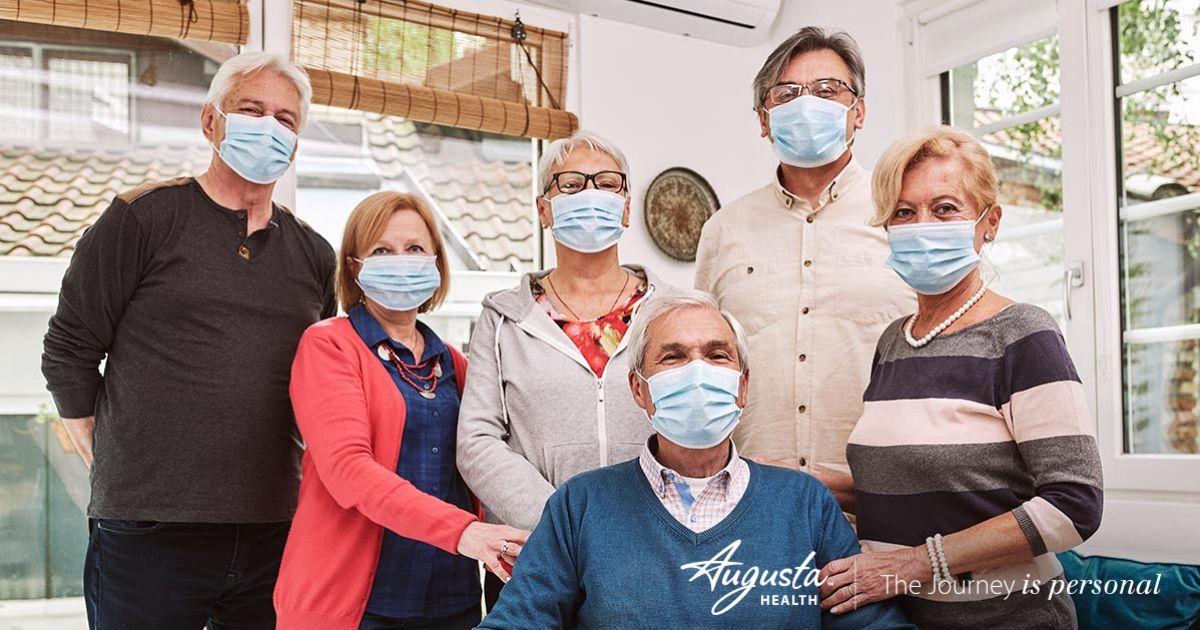Gatherings & Get-Togethers During a Pandemic: Tips for Staying Safe & Healthy

Date: November 12, 2021
Categories: Health Focused, Mental Health
As the temperatures nudge colder and the days grow shorter, a bright spot of the fall and winter seasons each year is the holiday gatherings. But the celebrations—Thanksgiving, Hanukkah, Christmas, Kwanzaa and New Years—usually include indoor gatherings of friends and families, crowded parties, and travel. All of these activities increase the risk for getting or spreading COVID-19. So how do we reduce risk for our own parties and the ones we attend? Here, from the Augusta Health Infection Prevention specialists and the CDC, are some tips to keep you and your loved ones safe and healthy.
First and foremost, there are some who should simply not attend gatherings or in-person celebrations. They are:
People with or exposed to COVID-19
Do NOT host or participate in any in-person events if you or anyone in your household:
- Has been diagnosed with COVID-19 and has not met the criteria for being safe around others.
- If you had symptoms, it must be 10 days since your symptoms first appeared AND 24 hours with no fever (without fever-reducing medications) AND minor symptoms (loss of taste and smell) are improving.
- If you did not have symptoms but tested positive, you must wait 10 days past your positive test.
- Has symptoms of COVID-19.
- Symptoms include fever or chills, cough, shortness of breath or difficulty breathing, fatigue, muscle or body aches, headache, loss of taste or smell, sore throat, congestion or runny nose, nausea or vomiting, and diarrhea.
- Is waiting for a COVID-19 test result.
- Has been exposed to someone diagnosed with COVID-19 in the past 14 days.
People with an increased risk for severe illness:
- This includes older adults, with the greatest risk among those age 85 or older.
- This includes those with certain medical conditions such as cancer, chronic kidney disease, COPD, heart conditions, a compromised immune system, severe obesity, pregnancy, sickle cell disease, type 2 diabetes and smokers.
Then, if you are hosting an in-person gathering, consider these tips for the health and safety of your guests:
- As weather permits, keep your gathering outdoors as much as possible. If you do need to be indoors, avoid crowded and poorly ventilated spaces. Increase ventilation by opening windows and doors.
- Host activities only with people from your local area as much as possible.
- Limit the number of guests.
- Encourage guests to follow COVID-19 safety practices, even indoors: Wear masks when not eating; Wash hands often; Socially distance by at least six feet.
- Provide supplies to your guests to make it easy and convenient to follow the COVID-19 safety practices: Have a supply of extra masks so guests don’t share or swap masks; Provide ample hand sanitizer that contains at least 60% alcohol; Place chairs and table six feet apart, with separate tables for each household
- If your guests will be coming from outside the local area, ask them to avoid contact with people outside their households for 14 days before the event—for example, don’t eat at restaurants or attend indoor gatherings
If you are the guest at an in-person gathering, consider these tips for the health and safety of your hosts and other guests:
- If you’ll be traveling to the gathering, check with your host for updated information on COVID-19 spread in the community and any local guidelines. Make sure they have plans in place to help prevent the spread of the virus. Finally, know the guidelines for your own community and workplace for return after traveling to another location.
- Bring supplies to help you and other guests stay healthy. Extra masks and hand sanitizer make perfect hostess gifts!
- If possible, avoid contact with people outside your household for 14 days before the gathering and 14 days after you return. For example, don’t eat at restaurants or go to crowded shopping malls.
Gathering with friends and family are important social traditions during the holidays, but it’s just as important to keep everyone safe and healthy during the gatherings.
